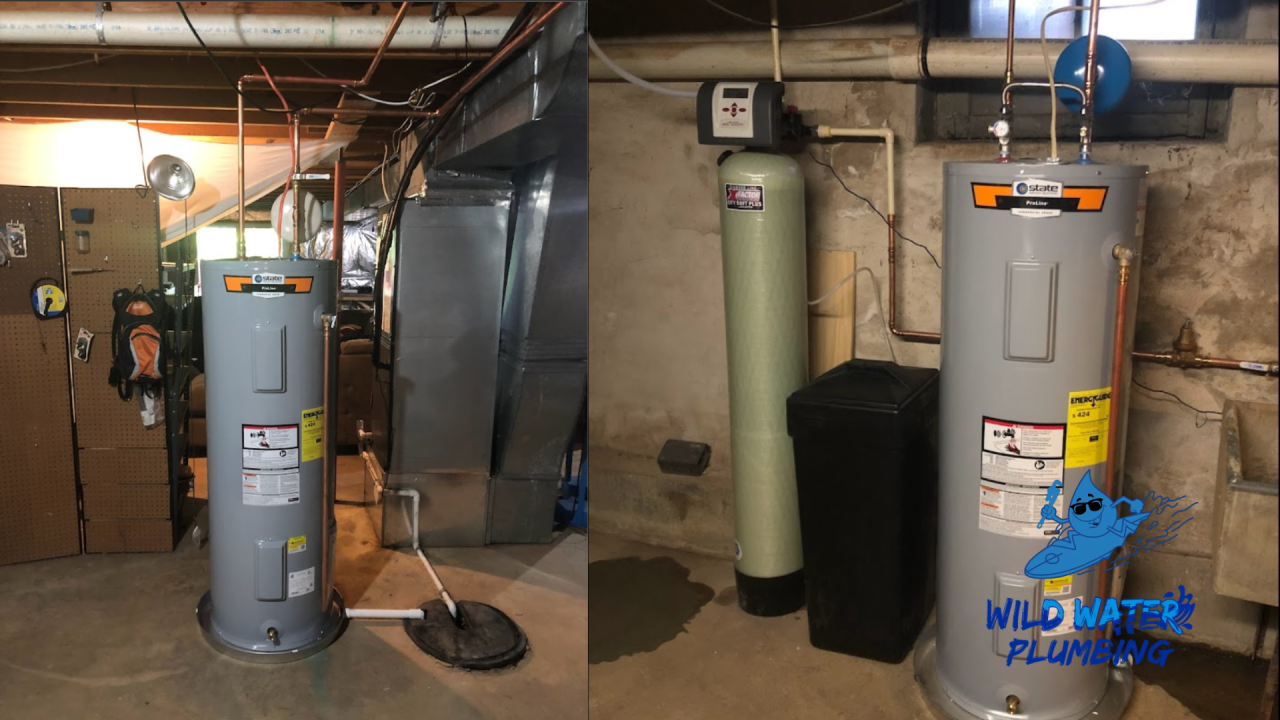Gas and Electric Water Heaters: A Guide for Jacksonville, NCA Full Guide To Gas And Electric Water Heaters In Greater Jacksonville, NC
Choosing, maintaining, or troubleshooting a water heater in greater Jacksonville, NC, usually involves several questions. Whether you are looking at a gas or electric model, knowing the key differences, costs, and safety considerations is important. This guide answers the ten most frequently asked questions about water heaters, giving you detailed insights that will help guide your decisions.
Which is Better: Gas or Electric Water Heater?
Comparison:
When choosing between a gas-powered and an electrical water heater system for your home, many factors must be considered, such as efficiency levels, installation costs, and the energy source it uses.
For instance, typically speaking, gas units tend to heat up much faster than their electric counterparts but may prove more expensive in regions where natural gases are not readily available or cost-efficient.
Conversely, again, depending on where you live, solar energy might be an option, so having an electricity-run one could work better.
These factors should be reviewed before making any commitments because they will significantly affect how well each type suits one’s needs.
Suitability:
For those living within the Greater Jacksonville, NC, availability and cost may also depend upon that location.
If there already exists a natural line going into one’s house, then this choice would make sense since it will save on power bills over time.
However, suppose electricity becomes abundant rather than scarce after some point due to increased infrastructure investments made by power companies OR implementation plans by government agencies concerned about global warming, such as those involving widespread adoption of renewable energies.
In that case, people might want to switch from using fossil-fueled devices like these, mainly because they have been proven over time.
How Long Do Gas And Electric Water Heaters Last?
Lifespan:
On average, gas models last from eight (8) years minimum up to twelve (12) years, while for electric ones, this number is between ten (10) and fifteen (15). The exact duration can depend on multiple factors, including maintenance schedules, water quality, and usage patterns.
Factors Affecting Longevity:
- Maintenance: One way to increase the lifespan of your tanks is to regularly maintain them by flushing them out or checking if their anode rods need replacements.
- Water Quality: In areas where hard waters prevail, such as some parts found within greater Jacksonville, NC, it’s not unheard of that mineral build-ups occur inside both types, thereby shortening their life expectancies further still.
Usage: Simply put, the more often you use something or consume anything in general, the shorter its lifespan will be, not to mention the lifespan of heaters for hot showers!
How Much Does It Cost To Install A Gas Or Electric Water Heater?
Cost Factors:
The type of installed heater, local labor rates, and additional components like expansion tanks or venting for gas models will all contribute to the total cost.
However, electric units generally have cheaper installations because they do not require gas lines or ventilation systems, which may be compulsory depending on where one resides within the greater Jacksonville area.
Types:
- Tank Water Heaters: These hold lots of hot water and come in different sizes.
- Tankless Water Heaters: These are more energy efficient, but need to be sized right for your home’s hot water needs.
5. How Energy-Efficient Are Gas and Electric Water Heaters?
Efficiency Ratings:
The efficiency of a water heater is measured by its Energy Factor (EF) rating. This shows how much hot water the unit can produce from each fuel unit it consumes. Electric models usually have higher EF ratings than gas-powered ones; however, electricity may be costlier than gas, thus making them pricier to operate.
Operating Costs:
Regarding operating costs, remember that prices are not the same everywhere in the Greater Jacksonville, NC, area.
If we consider only cheapness per gallon, natural gas wins hands down as far as operational costs are concerned.
However, electric heaters can be more efficient for homes powered by solar or other renewables.
6. What Are the Signs That My Water Heater Needs Replacing?
Warning Signs:
- Age: When a tank type reaches its 10th anniversary mark, this might be a sign that replacement is near due to aging concerns alone without any additional reasons attached.
- Efficiency Drop: If your WH is becoming inefficient at doing its job, you will notice less availability of heated water or higher energy bills. This leads us straight into the next section, so please pay attention here! Also, remember—if repair frequency doubles annually after the first fix is made, then something serious happened somewhere inside…
- Repair Needs: Leaks happen all around us, but never underestimate their power over appliances like heaters, especially those installed within confined spaces such as basements, etc., where the moisture level stays high most of the year. Unusual noise from the thermostat could mean it’s faulty (either due to age or malfunctioning). Again, these are just a few examples, so use common sense whenever possible.
Risk Factors:
It is highly recommended not to ignore any of these signals; otherwise, you might end up dealing with much bigger issues later on, such as complete loss of hot water or, even worse – severe floods caused by leaking pipes attached directly onto walls instead of being placed behind them like they should’ve been designed originally for safety reasons only! Replacing aging WHs prevents this while increasing overall efficiency levels throughout the household, thereby creating healthier living conditions altogether…
7. How Do I Flush or Maintain a Water Heater?
Maintenance Steps:
Regular maintenance is necessary to keep your water heater working properly. At least once per year, drain the tank to remove sediment that can reduce heating efficiency and shorten the unit’s life.
Also, the anode rod must be checked, and the thermostat must be tested periodically.
Frequency:
If you live in Greater Jacksonville, where hard water is prevalent, consider cleaning more often than usual because minerals tend to accumulate faster, thus obstructing the heat transfer process within the system.
This leads to higher energy consumption and shorter lifespan expectancy, which we don’t want, do we? A well-kept water heater will last longer and operate better overall, so follow these simple tips religiously!
8. Can I Switch from a Gas to an Electric Water Heater (or Vice Versa)?
Conversion Considerations:
Changing between gas and electric-powered models requires significant work on the home infrastructure itself; if it’s impossible due to technical reasons, then forget about trying to change anything. Nothing will happen anyway except maybe breaking something significant, so be careful here, please!!!
For instance, when moving from a gas line, a connection has to be installed while ensuring proper ventilation at the same time, etc…
Conversely, those who switch away from electrically powered units towards natural gas alternatives will need to lay a new pipe alongside other necessary adjustments within the household.
Benefits and Drawbacks:
Each option has its benefits and drawbacks. Electric water heaters are more straightforward to install and maintain, while gas ones have lower operational expenses.
Fuel prices are low, especially when looking at long-term results, so choose wisely based on these two factors before making a final decision about this matter!
Solutions:
Regular maintenance, which includes draining the tank and checking parts, can fix these problems. If these measures don’t work, it’s about time you contacted our plumbers, who can diagnose and fix the heater for you.
10. What Are the Safety Concerns with Gas Versus Electric Water Heaters?
Gas Safety:
Combustion, ventilation, and gas leakage are dangers of using gas water heaters.
Proper installation coupled with routine maintenance can avoid carbon monoxide poisoning and gas leakages. It is very important to have a carbon monoxide detector near your gas-operated water heater.
Electric Safety:
Though safer than fuel-based heaters since no combustion is involved, electric-powered units still have their share of risks, which are mainly electrical, especially if wiring was done poorly or has become obsolete over the years. Such hazards can be lessened by ensuring such connections are made onto an earthed circuit, which should also undergo frequent checks to ensure it is always in good condition.
Wrap-up
For residents of Greater Jacksonville, NC, selecting and maintaining an appropriate water heating system is very important.
Whether you prefer gas or electric models, understanding differences in cost along with safety considerations will enable you to optimize energy use while keeping reliability higher at home for all-time hot showers.
For more personalized recommendations or expert installations, kindly seek help from our plumbers. They know about the unique requirements and climate patterns prevalent in this area of North Carolina state.


